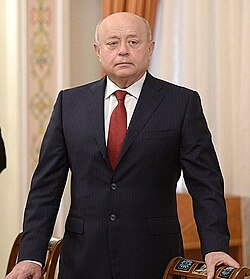Mikhail Fradkov
| Mikhail Fradkov Михаил Фрадков |
|
|---|---|
 |
|
| Director of the Foreign Intelligence Service | |
|
In office 6 October 2007 – 5 October 2016 |
|
| President |
Vladimir Putin Dimitry Medvedev |
| Preceded by | Sergei Lebedev |
| Succeeded by | Sergey Naryshkin |
| Prime Minister of Russia | |
|
In office 5 March 2004 – 14 September 2007 |
|
| President | Vladimir Putin |
| Preceded by | Mikhail Kasyanov |
| Succeeded by | Viktor Zubkov |
| Personal details | |
| Born |
1 September 1950 Samara, Russian SFSR, Soviet Union |
| Nationality | Russian |
| Political party | Independent |
| Spouse(s) | Elena Ludenko-Fradkova |
| Children | Peter Pavel |
| Awards | Order of Honour (Russian Federation) |
Mikhail Yefimovich Fradkov (Russian: Михаи́л Ефи́мович Фрадко́в; IPA: [mʲɪxɐˈil jɪˈfʲiməvʲɪtɕ frɐtˈkof]; born 1 September 1950) is a Russian politician and statesman who was the Prime Minister of Russia from March 2004 to September 2007. Fradkov was the head of Russia's Foreign Intelligence Service from 6 October 2007 to 5 October 2016.
Fradkov was born near Samara to a family of Jewish origin on his father's side. He studied at both the Moscow Machine Tool Design (станкоинструментальный) Institute (graduated 1972) and the Foreign Trade Academy (graduated 1981). In 1973, he was posted to the economic section of the Soviet Union's embassy in India, where he remained for two years. He later held several positions back in Russia. In 1991, he was Russia's representative to General Agreement on Tariffs and Trade (GATT) in Geneva.
In late 1992, Fradkov was appointed Deputy Minister for Foreign Economic Relations. Less than a year later, in October 1993, he became First Deputy Minister for Foreign Economic Relations. On 15 April 1997, a presidential decree by Boris Yeltsin appointed Fradkov Minister of Foreign Economic Relations and Trade, a post which he kept for nearly a year. In the middle of 1999, another presidential decree made him Minister of Trade. He was made director of the Federal Tax Police by Vladimir Putin in 2001, having previously been Deputy Secretary of the Security Council. In 2003 he was made Russia's representative to the European Union. On 1 March 2004, he was nominated by Putin as the next Prime Minister, and this appointment was approved by the Duma on 5 March.
...
Wikipedia
